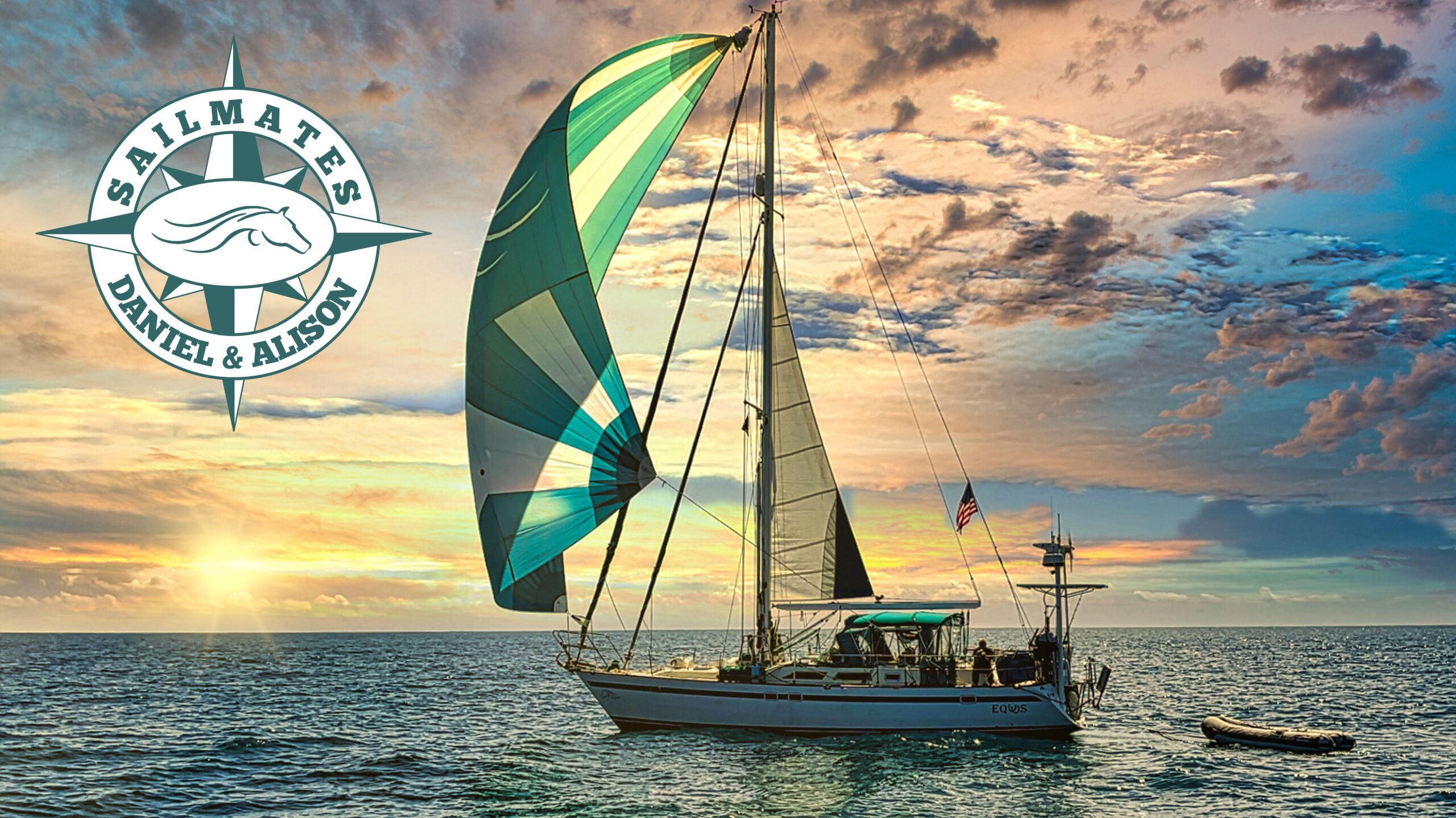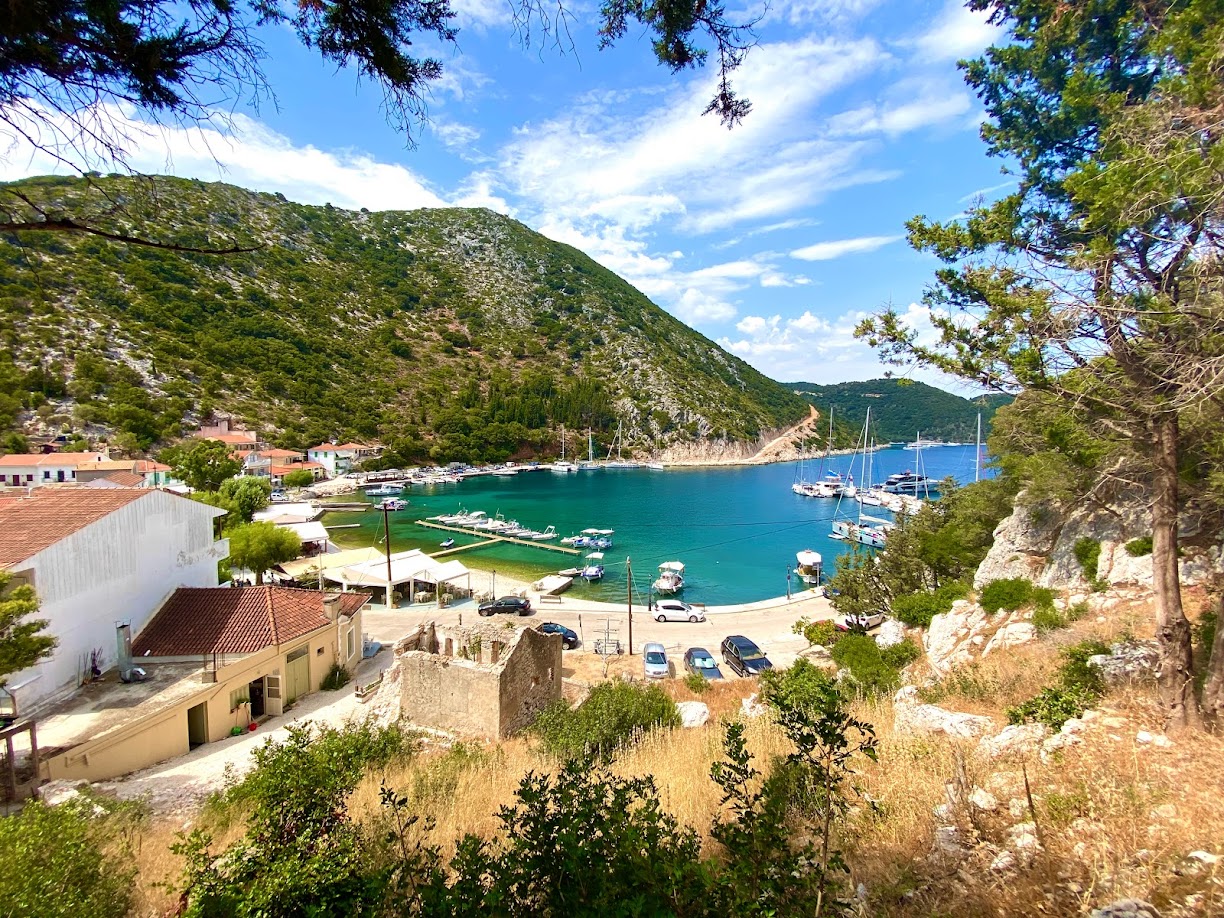“Travel isn’t always pretty. It isn’t always comfortable. Sometimes it hurts, it even breaks your heart. But that’s okay. The journey changes you; it should change you. It leaves marks on your memory, on your consciousness, on your heart, and on your body. You take something with you. Hopefully, you leave something good behind.” – Anthony Bourdain
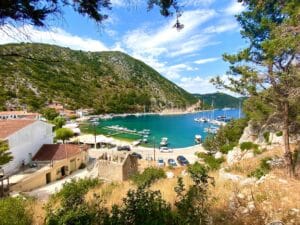
As I reflect on our time in Greece, it all seems like such a whirlwind. We spent two full months there and yet I have difficulty recalling all the places we landed. The problem with sailing around the world is that your time at each location is very limited. When we sail into a new harbor, we have to research what we can see in a couple of days and figure out how to get there. Sometimes, the best we can do is take a brief walk through town. We can’t always rely on buses and car rentals as some places have limited access to transportation.
We’ve even arrived at a harbor intending to explore, only to be left admiring the views from our cockpit as there was no viable place to bring our dinghy to shore. We never know what we will be encountering. We do have lovely views of the shorelines and seaside towns from our sailing perspective, an opportunity most people don’t have when they fly somewhere new. The drawback is we get a little taste of each country but have to keep moving before we get to know her well.
Traveling through Greece was unique in that the paperwork and restrictions were nothing like we had experienced in any other country. When we checked into Greece after leaving Albania, we headed into the well-known port of Corfu, a common check-in point for sailors entering Greece. Each country we sail into has specific requirements before we can visit. They require boat documentation, insurance, passports, and often sailing fees.
The paperwork can be arduous and always involves some very large, grim, and unhospitable officer who gives you the impression you could be thrown in jail at any moment if you don’t provide the correct answers to his questions. You have to tell him where you came from, how long you will be staying, and where you are going next. Next, that person will spend the next five minutes flipping through all your passport pages, multiple times, all the while muttering under his breath and shaking his head… just to make you nervous. I’m sure this is specialized training for all border agents.
Kudos to Greece. They found a way to make this arduous process even worse. We could have hired an agent to help us with the check-in process for a hundred bucks. Or, as we read on our sailing sites, we could follow the multiple steps to check in on our own. We should have coughed up the hundred bucks.
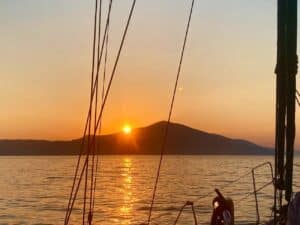
We arrived in Corfu in just after lunch and raised our yellow quarantine flag. We took our dinghy to shore and pulled up Google maps. We had to find the harbor police first and provide them with our documentation. Google doesn’t do well finding remote offices in foreign countries. After walking a couple of miles, wandering, asking directions, and following wrong directions at least 3 times, we finally found the harbor police. They didn’t speak English very well so we spent an hour trying to nail down all the details and requirements.
We were handed a travel log. We were told we had to check into each major port we visited and get this log stamped by officials. We had to present this log of where we had been when we checked out of Greece. Can I just say “Oh Boy!” now? The log from hell would come to rear its ugly head later in this story.
Excited to have step one completed, although it was a struggle, we proceeded with a bounce in our step to the next phase, immigration. It was at least a mile from the harbor police. Once again, Google maps led us to a huge building, but there was no indication of where on this complex the immigration office resided. It was a complex outside the ferry terminal where we could see streams of people entering and exiting from an array of vessels lining the dock, so at least we knew we were in the right place.
One door had a sign indicating this is where the immigration office was, but the door was closed and looked like it had been for years. Upon circling the gigantic building, we found the main entrance. We headed inside with a dozen or so other confused-looking people. There were no signs for immigration, no windows open for business, and not a single official-looking person to ask.
After wandering around for quite some time searching inside and out for some type of sign and futilely asking questions to people who spoke no English, I finally went to a small snack bar at the far end of the hall. Lo and behold, the single employee spoke English. I explained our plight of looking for immigration, having just come off a sailboat and having already been to the harbor police. He directed us to find a steel gray door at the far end of the building. He explained if we knocked, someone would eventually open the door.
Shady as this all sounded, we proceeded to the gray door and knocked. Five minutes later a lady peaked her head out the door. We told her we were sailors looking for immigration. She waved us in.
Funneling in from the back of the building, a rear door facing the ferry terminal, people entering Greece from the ferries were waiting in an immigration line. As the whole back of the complex was surrounded by an impenetrable towering fence, there was no way we could have walked to the back of the building and found this entrance. Thank God for Snack Bar Man.
We waited in line, much like you do at the airport when you have to go through immigration, and got asked several questions, then got our passports stamped. When they tried to funnel us back out, we explained we needed to go to the Customs Office, which was supposedly also in this building. Well, this created quite a disturbance. Apparently, not many sailors try to navigate their way through this experience without an agent. We got placed in chairs like the bad sailors we are for a time out to contemplate the error of our ways.
An hour later, we were invited back to the Customs Office. We had all our paperwork from the Harbor Police and our passports stamped. The problem was that we had not paid our cruising fees online. The website would not accept our US bank card. Fast forward to an hour later, phone calls, interrogations, and I’m quite sure a few insults in Greek. At this point, knowing what we now know, $100 for an agent is cheap.
We tried to pay in cash, we had been prepared and pulled out Euros. Change was a huge problem. We didn’t have exact cash and this caused another flurry of consternation. They were not used to handling money at this office, everyone either had an agent or paid online. Back to the time-out chairs for another hour. Bad, bad, sailors.
We were stuck in Limbo between immigration and customs. After an agonizing two hours, we convinced immigration to allow us to return outside the secure area to get exact change. Thank you again Snack Bar Man! The spring in our step was a little less springy as we departed immigration and customs, walked the mile back to the Harbor Police, and gave them the proof we had completed the other two steps. All was good, we were almost done and we couldn’t wait to be set free to explore Greece.
In Greece, you are charged a fee based on the size of your vessel. It doesn’t matter when you arrive and when you leave, you pay for the whole month even if you were there one day of that month. We told the police we were staying for two months, we had carefully timed our arrival for the first of August and planned on being out of Greece by October 1st.
Back at the police station, the man verified our documents, then had another set of papers to be filled out, a separate fee for taxing visiting sailors. We reiterated we were staying for 2 months, at least six times, paid our fees, collected our cruising log, crew sheet, permits, and several other pages I’m not sure what were for, and practically danced out of their office. We had an entire folder of papers for sailing in Greece. We had prevailed so we headed back to our boat thinking the worst was over. Quarantine flag down – Greece – here we come!
We arrived at our dinghy, headed back to our boat, and had a celebration happy hour. When I checked my phone, my steps tracker indicated we had walked over 7 miles to get checked into Greece. I felt sure that no matter how rocky the start, Greece would be worth every moment. The next morning we pulled up anchor to head around the island to the main city of Corfu. We couldn’t be happier!
Touring Greece
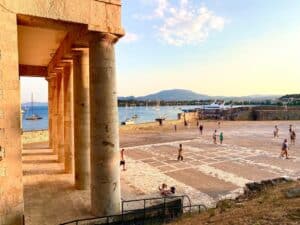
We popped out on the east side of Greece, home to thousands of tiny islands. Greece is a country where you can visit icons like the Parthenon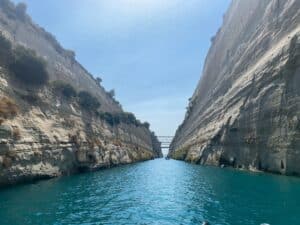
We so enjoyed island hopping. We visited the islands that were home to Greek legends and stood in shrines built for Poseidon two thousand years ago. Traveling between the islands was a bit tricky as the wind was never as predicted and the seas were very confused and choppy.
The wind would either be intense, or nonexistent. There seems to be no happy medium in Greece. On several of our longer passages between islands, the wind and waves were not kind. Our sailing skills were put to the test as we experienced a 42-knot unpredicted wind storm, a 30-knot gust funneling through a split in the island’s mountains that knocked us over, and going from becalmed to overwhelmed in mere minutes.
We took it all in stride until we realized our time in Greece was coming to end and we hadn’t been to one harbor that had harbor police that would sign our travel log. Rut row.
We did try. Even in Athens, there was no harbor police station near the harbor where we were anchored. We finally arrived in Milos, a popular tourist destination, and lo and behold they had a harbormaster. Dan and I made stopping there our first priority. We dinghied to shore, used our Google maps so we could wander around for an hour trying to find the office, and were told to come back in an hour. We killed the hour by having an exorbitantly priced beer by the waterfront. Tourist prices.
Passports and travel log in hand, we returned to the office, happy to finally have an opportunity to put something down on our log. We presented our documents only to be rebuked by the official.
“Where are your other papers?” he shouted. “I need boat documents, crew lists, insurance!”
Silly us. We should have known that the mounds of paperwork we presented to the Harbor Police, Immigration, and Customs upon entry to the country to obtain the Travel Log would also be necessary to get the travel log stamped at each harbor. This seemed grossly redundant to us but it was back to the dinghy, return to the boat, get all the paperwork, return to shore, and back to the office a third time.
A scowl immediately creased the man’s face as he looked at our blank travel log. We didn’t have a single entry since we checked in over a month ago in Corfu. This angered the man greatly.
We explained that we had been primarily sailing to small islands. There was no opportunity until Milos to get our log stamped. As unhappy as this made the man, that was the least of our problems. We were now 2 weeks until the end of September, and he claimed we had only paid for one month. We were illegally sailing in Greece not having paid for the second month!
Despite our testimony that we told the office in Corfu we were staying for 2 months, and we wanted to pay for two months, they only charged us for one. We couldn’t pay the office we were in, we had to go the following day, Monday, to pay at the Customs office.
Monday morning, we used our Google maps to wander aimlessly until we found someone who spoke English that could point us in the right direction to find the Customs Office. It was a tiny door on a side street that we would never have found following Google Maps. Dan entered, and came out 30 minutes later, having to show all his documentation again, tell his story, and pay for another month of sailing in Greece. At least we were now legal.
Back to the angry policeman’s office. We had a receipt for payment of our sailing fees. He greeted us with a big smile, stamped our travel log, and even called us his “American Friends”. We left with our paperwork in order and a huge sprig of basil they insisted I take from the bush outside their office.
Last Stop in Greece
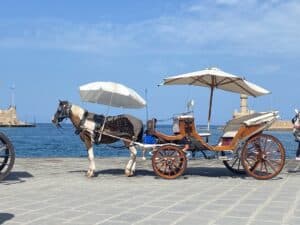
He assisted us in finishing our mooring and was very kind and helpful. Introductions were made and we had a new friend. He was a solo sailor and eager to converse and socialize. We came to find out we were in the presence of sailing greatness. Nicholas Charpy has successfully circumnavigated the world SEVEN times. He is signed up for the Golden Globe Race in a couple of years which is a race for solo sailors to circle the globe non-stop, not touching land, and without the aid of any modern electronics. This is a race for die-hards or the insane.
Nicholas raced for many years and was on a boat that set the world record for the fastest time to cross the Atlantic Ocean. Been there, sailed that, I spent the next couple of days feeding him my best cooking so I could pick this amazing man’s brain.
I asked him questions like how he stays sane weeks out at sea alone. He did admit that when he starts to go stir-crazy he puts a hat on his port winch and has conversations with it. He asked me why I thought he uses the port winch instead of the starboard. Of course, I didn’t have a clue. He answered, “Because the starboard one won’t talk to me.”
Nicholas had a tattoo on his chest of a beautiful young girl. I asked if that was his daughter and he said that it was. He was married once and sailed with his wife. They are now divorced and he sails solo. He regaled us with a few stories about his wife – that made quite an impression on me.
The first story was about his wife not being a sailor when they first set out. She was content not learning so he rectified that. He was sailing close to another boat one day, a friend of his, and called him on the radio and asked if he could sail up close to him. His friend said yes.
Nicholas steered the boat up to his friend’s boat, hopped aboard, and then told his friend to sail away. He left his wife alone on the boat and made her figure out how to sail it back to port, alone. She did make it back and lo and behold, figured out how to sail.
You would think she would have left him after that stint, but no, there were other stories. At one harbor, they got into an innocuous argument. His wife demanded that Nicholas hoist her up the mast to take pictures of the harbor from the top of the mast. Before he hoisted her up, he asked her why she was so angry at him. She replied, “I can’t remember”.
After hoisting her to the top, Nicholas left the boat to go have drinks with his buddies. He stayed out for 2 hours, long after darkness had set in. He left his wife at the top of the mast. While he was away, she yelled to those below she could see walking by but everyone just glanced up at the crazy lady and didn’t offer any help.
When Nicolas returned, he lowered her and she asked him why he had abandoned her at the top of the mast. He told her, “I wanted to give you time to remember why you were angry at me!”
I guess she remembered and forgave him because soon they were making the 4-week passage across the Pacific Ocean to the French Polynesian Islands. His wife was pregnant with their daughter and planned on delivering her baby in the islands. As fate would have it, his daughter decided to arrive a few weeks early. His wife went into labor in the middle of the Pacific Ocean.
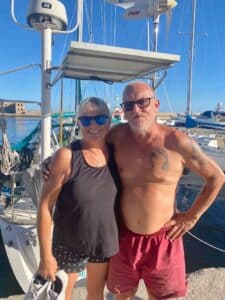
Unfortunately, the family divided and Nicholas refused to give up the sailing life. He continued to sail around the world. He made passages through the northern passage over Canada, through the middle via the Panama Canal, and along the southern route through the Indian Ocean. As I sat there contemplating what he had accomplished, I felt a bit silly for thinking it would be such a great feat for us to get around the world just once.
His last voyage however did not end well. He asked me if I had heard about it because there was lots of media coverage and an article about his misfortunes by the Ocean Cruising Club (OCC). We had not read it so he gave us the highlights.
Nicholas was on the verge of completing his seventh circumnavigation. His last leg of the voyage would be arriving in Antigua. He was around 700 miles away when he encountered a storm. His boat got struck by lightning. All power went out. His electronics were dead. Using his charts and sextant, Nicholas was able to hone in on Antigua, only 10 miles off course. He had been sailing straight through and was severely sleep-deprived when he limped into Antigua. Covid had just reared its ugly head, so the first thing the officials did was tell him he was going to have to quarantine for 14 days after having been alone at sea for weeks.
Upon hearing that Nicholas had arrived in Antigua, after having been struck by lightning, the BBC sent their news crew to interview him. He spilled his story. When asked what was his least favorite part of the voyage, he replied, “Having to quarantine for 14 days in Antigua after sailing across an ocean!”.
Nicholas was released from quarantine the very next day.
Sitting and listening to Nicholas’s stories helped me put our life into perspective. Many of my phobias and anxieties I have when I head out to see are so very unwarranted. I made a vow to be more like Nicholas and trust in our ability to sail around the world.
Checking Out
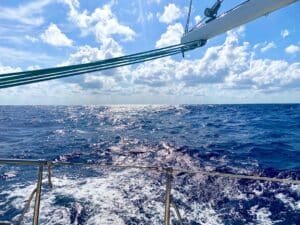
We found the Harbor Police office and gave them our travel log. They immediately informed us that if we were in Greek waters in October, we would have to pay for the whole month and gave us their official pamphlet on cruising fees. They said they would stamp and collect our travel log when we checked out. We were resigned that we would have to pay the sailing fee to officially check out. Back on the boat, Dan leafed through the pamphlet and, lo and behold, it said cruisers leaving within 3 days of expiration would not have to pay. The battle was back on to save $104!
The next morning, the weather window opened and we were ready to cross to Malta. Our first stop was the Harbor Police. They told us they would not check us out until we paid the marina fees. “Bring us the receipts.”
We asked if they would stamp our passports for exit and they told us we had to go into town to the regular police station. It was a mile-and-a-half walk. Once we had the marina receipts and our passports stamped, they would take our travel log and allow us to exit. We started walking.
First, we went to the marina office and spent almost an hour completing the paperwork to leave the marina. Each fee, water, electricity, and mooring fee was a separate set of paperwork. It took the man forever to fill in the forms, and charge each item separately.
Next, we hiked the mile and a half through town to the police station. We arrived and asked the receptionist where we could get our passports stamped. She had no idea what we were talking about.
It’s safe to say I got a little animated at this point. I looked at her, clearly agitated, and said, “Immigration? Passports?”
She wasn’t clear on if we were coming in or going out. Apparently, this didn’t happen often at this office. Finally, she pointed upstairs. As we walked up the stairs, a big sign said, “Immigration”.
After searching the unlabeled office doors on the second floor, we finally found the man who would stamp us out of Greece. We presented our paperwork and passports. He looked through them and announced, “You have to be checked out by the Harbor Police before I can stamp your passports.”
There are times in your life when enough is enough, and I had had enough. “We just left the Harbor Police,” I seethed, daggers shooting out of my eyes. “They told us we needed to come here and get our passports stamped before they would check us out. We walked a mile and a half to get here. Are you really going to make us walk another 3 miles to verify this or do you think you could make a phone call?”
This landed us back out in the hallway and seated in the “bad sailors” chairs for another hour while he took his time making a phone call.
We were allowed back in his office when he received the faxed verification he could stamp our passports from the Harbor Police. As per the protocol, he leafed through our passports several times, shaking his head and muttering under his breath. Finally, we heard the most rewarding sound in the world, the “chunk” of the passport stamp.
Breathing a sigh of relief, we walked the mile and a half back to the Harbor Police ready to do battle with them over the fee they implied we had to pay. It was different officials who either knew the rules better or more likely recognized a tired and desperate look when they saw our faces. They took our log, waved, and said, “have a nice voyage.”
Leaving Greece
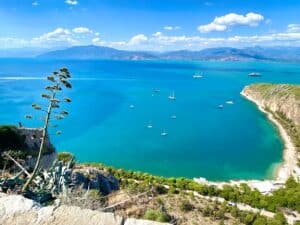
We successfully made it to Africa, but not by the route we had originally planned. But that is a story for another post.
Fair winds and following seas, and may you forever be immune to the “bad sailors” chairs.
Dan and Alison
s/v Equus

